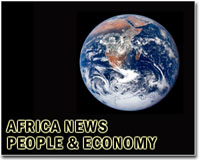| . |  |
. |
N'Djamena, Chad (UPI) May 26, 2010 Violence-ridden Chad, one of the world's poorest and most corrupt states, is on the brink of a humanitarian disaster after its government demanded the U.N. Security Council withdraw a 3,300-strong peacekeeping force. U.N. officials said Sunday that 2 million people -- 18 percent of the population -- face famine in the central African state and will be even more vulnerable once U.N. troops depart. Amnesty International warned Monday that 500,000 refugees, mainly in the eastern part of the country where the U.N. forces were deployed, are at serious risk from armed groups and brigands who terrorize much of the country. Half the refugees come from the war-torn province of Darfur in neighboring Sudan. The rest are from the Central African Republic or are displaced Chadians. Chad, a former French colony, has been plagued by political violence since independence in 1960. Civil war erupted in 1965 and dragged on until 1979, when the victorious rebel chiefs fought among themselves. Chad's president, former Gen. Idriss Deby, seized power in 1990. U.N. officials have warned, once the peacekeepers have gone, genocidal bloodletting on the scale of Darfur could erupt in Chad. On Tuesday, the Security Council ordered the peacekeeping force, which deployed in 2007, to pack up by the end of the year. A smaller force in the neighboring Central African Republic, another violence-battered zone, will also be withdrawn because it depends on the force in Chad for logistics and supplies. The withdrawal was a serious blow to U.N. peacekeeping in Africa, a continent wracked by constant conflict since the end of the colonial era in the 1950s and '60s. The Democratic Republic of Congo, ripped apart for decades by wars over its vast mineral wealth, has also told the United Nations to pull out its peacekeeping forces ahead of elections scheduled for 2011. The Security Council took the unusual move of pulling out its forces in Chad after Deby's regime demanded a U.N. withdrawal in March as the force's mandate came up for renewal. Deby claimed the U.N. mission was a failure because the troops never ventured outside their camps and the United Nations failed to initiate promised infrastructure projects. John Holmes, the U.N. emergency relief coordinator in Chad, warned Sunday that in the security vacuum created by the U.N. withdrawal relief agencies wouldn't be able "to protect the population, refugees, displaced persons and humanitarian workers." Deby's regime has assured the Security Council that it will do that but U.N. officials like Holmes, who is also the U.N.'s undersecretary-general for humanitarian affairs, and the aid agencies operating in Chad are highly skeptical. Erwin van der Borght, Amnesty International's Africa director, declared Sunday that the Security Council's decision "is premature and dangerous. "It will increase insecurity in the area and undermine attempts to provide emergency humanitarian assistance "It is wholly unacceptable that this resolution is taking place before the Chadian government has shown it has a concrete plan in place to provide security and it is deeply disturbing that those whose rights are on the line have essentially been cut out of the debate "The fact that the U.N. is being pushed out of the country long before the mission has succeeded sets a very worrying precedent for human rights protection and undermines the U.N.'s authority and credibility." On Tuesday, the U.N. Food and Agriculture Organization, based in Rome, warned that Chadians' plight has been worsened by a dramatic shortfall in donations for relief supplies there. Because of this, 2 million people have been put at risk of extreme hunger, the FAO declared. The funding shortfall means that only $2 million out of the $11.8 million requested in November for emergency relief would be available for Chad. Officials explained that this was because neighboring Niger, a largely desert country also beset by severe food shortages, had got the lion's share of donations, around $14.5 million. "Donors are afraid of a repetition of the 2005 food crisis in Niger, when many people starved to death," said FAO official Fatouma Seid. "There's less awareness of what's happening in Chad, although the situation there is just as critical."
Share This Article With Planet Earth
Related Links Africa News - Resources, Health, Food
 Somali Islamists seize more of capital
Somali Islamists seize more of capitalMogadishu, Somalia (UPI) May 25, 2010 Islamist al-Shebab militiamen have seized several districts of war-battered Mogadishu and shelled the Somali presidential palace in an offensive apparently intended to thwart a long-delayed big push by the U.S.-backed government. The gains made by the Islamists, who are aligned with al-Qaida, are a severe setback for Somalia's fragile Transitional Federal Government and for Washington's ... read more |
|
| The content herein, unless otherwise known to be public domain, are Copyright 1995-2010 - SpaceDaily. AFP and UPI Wire Stories are copyright Agence France-Presse and United Press International. ESA Portal Reports are copyright European Space Agency. All NASA sourced material is public domain. Additional copyrights may apply in whole or part to other bona fide parties. Advertising does not imply endorsement,agreement or approval of any opinions, statements or information provided by SpaceDaily on any Web page published or hosted by SpaceDaily. Privacy Statement |